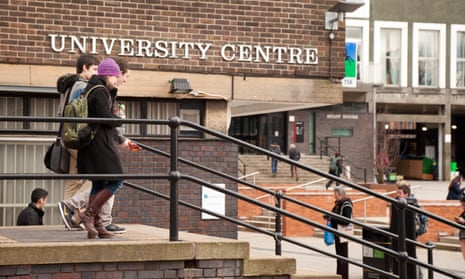Staff at 60 universities across the UK are to walk out on strike later this month over pensions, pay and conditions in a wave of action which could disrupt the studies of more than a million students, according to union leaders.
The University and College Union (UCU) has announced eight days of strikes, starting on 25 November and running until 4 December. After that, industrial action will continue with members working to contract, so they are unable to cover for absent colleagues or reschedule lectures lost to strike action.
The universities affected include many of the biggest and most prestigious institutions in the UK, including Oxford, Manchester, University College London, Durham, Leeds, Liverpool, Bristol, Birmingham, Cardiff, Edinburgh and Cambridge.
Announcing the industrial action, the UCU general secretary, Jo Grady, said: “The first wave of strikes will hit universities later this month unless the employers start talking to us seriously about how they are going to deal with rising pension costs and declining pay and conditions.”
The action comes less than two years after tens of thousands of university lecturers, librarians, researchers and other academic staff walked out over changes to their pensions, striking for 14 days in an unprecedented wave of action on 65 British campuses.
This year, as well as the dispute over changes to the universities superannuation scheme, which is still unresolved, university workers are in dispute over pay, equality, casualisation and workload. The union estimates that more than half of all academics are on temporary contracts and pay has fallen by 17% in real terms since 2009.
Following the most recent ballot, staff at 43 universities will be taking action over both disputes; 14 over just pay and conditions, and three over the USS pension. During the last round of action in February and March 2018, 65 universities voted in favour of strike action in the USS dispute.
In total, 140 universities were balloted over pay and conditions, as well as all 69 institutions affected by the USS changes. According to the UCU, strike action was backed by 79% of voters in the pensions ballot and 74% in the ballot on pay, equality, casualisation and workloads.
“Any general election candidate would be over the moon with a result along the lines of what we achieved last week,” said Grady. “Universities can be in no doubt about the strength of feeling on these issues and we will be consulting branches whose desire to strike was frustrated by anti-union laws about reballoting.”
The union urged universities to respond “positively and quickly” if they wanted to avert strike action and warned that more than a million students could be affected by the action.
Last year, the union succeeded in forcing employers to drop plans to change pensions at universities established before 1992 from defined benefit schemes to the less favourable defined contribution schemes. It is now challenging the size of staff contributions, which it thinks should be capped at 8% of a lecturer’s salary, rather than the 9.6% proposed by employers.
Universities UK, which is the collective voice for 136 universities and speaks on the USS, said it was hopeful the dispute could be resolved but plans were in place to ensure minimal disruption to students and staff. “The resolution to the 2018 USS valuation is both fair and reasonable, with the additional costs of maintaining the current level of benefits shared 65:35 by employers and scheme members” it said.
A spokesperson for the Universities and Colleges Employers Association, which negotiates pay, said: “Action of this kind will be damaging to students, lose UCU members money and risk undermining the collective bargaining arrangements. It is completely unrealistic in the collective pay arrangements for UCU to attempt to force all 147 employers to re-open the concluded 2019-20 national pay round.”
